Medical Disclaimer: This article is for informational purposes only and does not replace professional veterinary advice. Always consult your veterinarian.
If your new puppy has worms , you’re not alone and you’re not a bad pet parent. Parasites are extremely common in puppies, even those from good breeders. As a small-animal vet in Canada, I often treat wiggly little patients for roundworms, hookworms, or tapeworms during their first visits. Thankfully, with timely puppy deworming, these pests can be safely removed before they affect growth or spread to humans.
Key Takeaways
Puppies are born with a high risk of intestinal worms, which can harm their health and even spread to humans. Common signs include diarrhea, a bloated belly, scooting, or visible worms in stool. Deworming starts as early as 2 weeks old and continues monthly until 6 months. Prescription medications like pyrantel, fenbendazole, or combination dewormers are typically used. Always follow your vet’s plan and maintain good hygiene to protect both pets and people.
Table of Contents
What Are the Signs of Worms in Puppies?
Worm infestations can be subtle or severe, and different parasites cause different symptoms. Here’s what to look for:
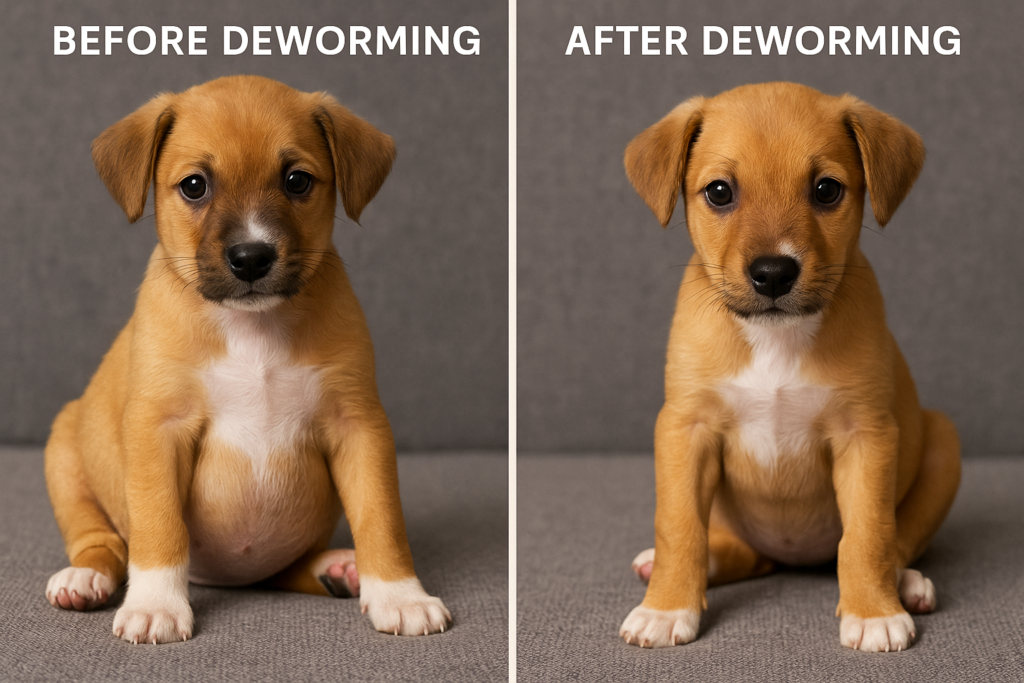
Roundworms
- Bloated, pot-bellied appearance
- Poor weight gain or thin body
- Vomiting or soft stool
- Dull coat or poor energy
- Long, spaghetti-like worms visible in stool or vomit
These are the most common intestinal parasites in Canadian puppies. I often see them on routine fecal tests even when puppies seem healthy.
Hookworms
- Pale gums (a sign of anemia)
- Weakness, tiredness
- Black, tarry, or bloody diarrhea
- Poor appetite or stunted growth
Hookworms feed on blood, and in severe cases, I’ve seen puppies become lethargic almost overnight. Quick treatment is critical.
Whipworms
- Soft stool or chronic diarrhea with mucus or blood
- Straining to poop (tenesmus)
- Weight loss or “failure to thrive”
- Intermittent signs that can be missed without stool testing
Whipworms are less common in very young puppies but may be seen in older ones in shelters or rescues.
Tapeworms
- Scooting or licking the rear
- Rice-like white segments stuck to fur or in bedding
- No weight loss unless the infection is heavy
Tapeworms often result from fleas. If I see tapeworm segments, I always recommend a flea check too.
Other Red Flags to Watch
- Vomiting
- Diarrhea (with or without blood)
- Coughing (especially with lung migration in roundworms)
- Poor coat quality or appetite
Puppy Deworming Schedule by Age
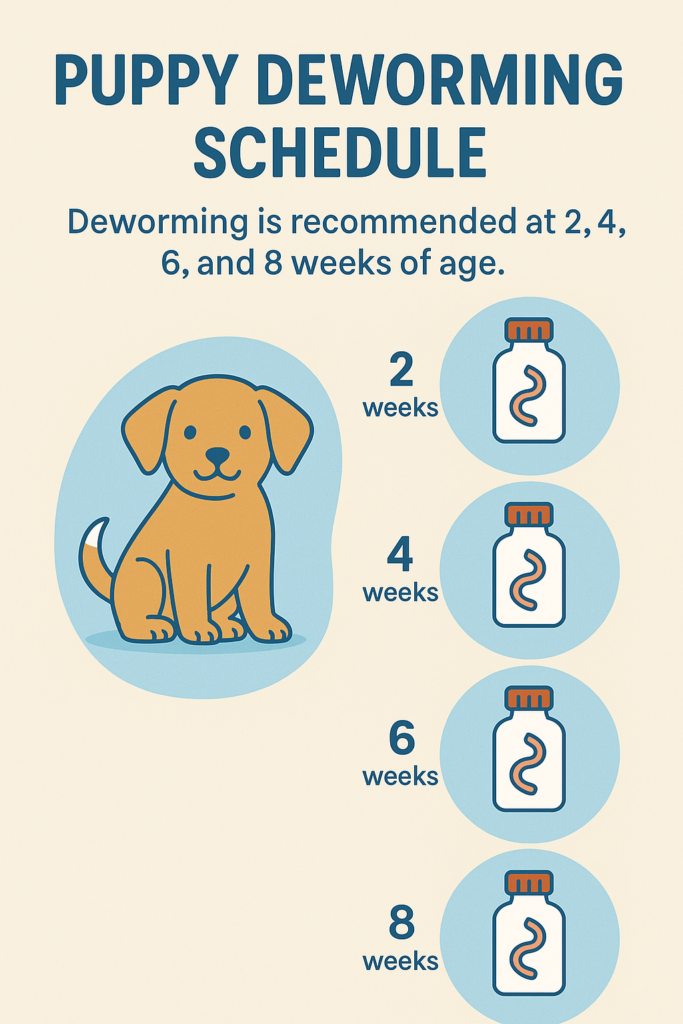
Starting early and sticking to a deworming schedule is one of the best ways to protect your puppy’s health. Here’s a vet-recommended timeline based on age:
First 2 Months (2–8 weeks)
- Deworm at 2, 4, 6, and 8 weeks of age
- This frequent deworming targets roundworms and hookworms passed from the mother
In my practice, I often start with pyrantel at 2 weeks, especially in large litters or rescue puppies with unknown histories.
2 to 6 Months
- Deworm monthly until your puppy is 6 months old
- Typically done at 3, 4, 5, and 6 months
- This helps prevent reinfection as puppies explore and ingest parasite eggs from the environment
After 6 Months
- Many dogs transition to monthly heartworm/flea medications that also deworm for intestinal worms
- If not on a combo preventive, deworm every 3 months, per CAPC guidelines
Ask your vet which product is best for your region and your dog’s lifestyle.
Special Cases
- Puppies in homes with young children, immunocompromised people, or raw feeders may need monthly deworming beyond 6 months
- This reduces the risk of zoonotic infections (like roundworms that can cause blindness in kids)
✅ 5-Minute Home Deworming Checklist
- Mark deworming dates on a calendar
- Collect and save stool samples before vet visits
- Weigh your puppy regularly for accurate dosing
- Store dewormers safely and check expiry dates
- Wash hands after giving meds or handling poop.
Best Puppy Deworming Medications
There’s no one-size-fits-all dewormer. The right product depends on your puppy’s age, weight, and which worms are present. Here’s a breakdown of commonly used medications:
Common Active Ingredients
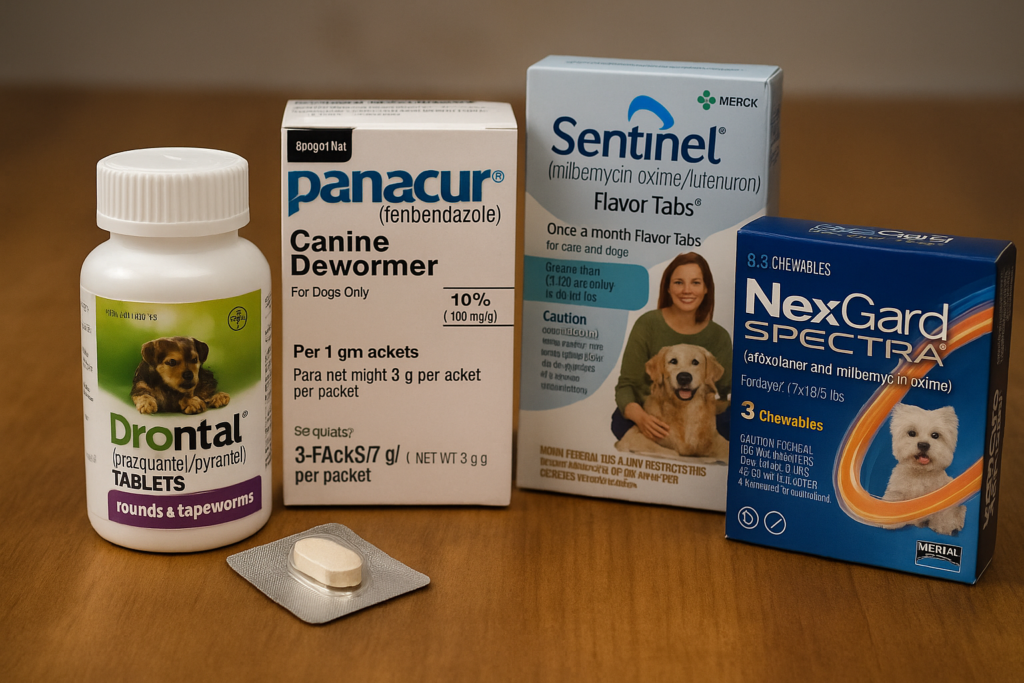
| Medication | Targets | Prescription? | Notes |
|---|---|---|---|
| Pyrantel pamoate | Roundworms, hookworms | OTC or Rx | Safe and widely used; often first-line in puppies |
| Fenbendazole (Panacur®) | Roundworms, hookworms, whipworms, Giardia | Prescription | Given for 3–5 days; well-tolerated |
| Praziquantel | Tapeworms | Prescription | Often combined with other dewormers |
| Drontal Plus® (Febantel/Pyrantel/Praziquantel) | Roundworms, hookworms, whipworms, tapeworms | Prescription | Broad coverage in one tablet |
| Milbemycin (Interceptor®, Sentinel®) | Roundworms, hookworms, +/- whipworms | Prescription | Also prevents heartworm |
| Ivermectin (Heartgard®) | Roundworms, hookworms | Prescription | Often part of monthly parasite control plans |
📌 Always consult your vet before giving any dewormer.
Prescription vs. Over-the-Counter
Over-the-counter (OTC) products usually only treat roundworms and hookworms. While useful, they may miss whipworms or tapeworms. In my clinic, I prefer prescription combos like Drontal or Sentinel to ensure full coverage.
Safety and Repeating Doses
- Most dewormers only kill adult worms
- A repeat dose in 2–3 weeks is often necessary to catch newly hatched larvae
- Always dose by current weight and follow your vet’s instructions
📊 Typical Canadian Deworming Costs (2025)
| Medication | Avg. Cost (per dose) | Notes |
|---|---|---|
| Pyrantel pamoate | $10–$20 | Often used for first doses |
| Panacur (Fenbendazole) | $20–$40 | 3-day treatment |
| Drontal Plus | $25–$50 | One-time dose, broad coverage |
| Sentinel or NexGard Spectra | $35–$70 | Monthly preventive combo |
| Fecal test (vet clinic) | $40–$70 | Recommended every 6–12 months |
Prices vary by region and clinic. Some products require a prescription or exam.
Hygiene and Parasite Prevention Tips
Deworming is just one piece of keeping your puppy (and your family) safe. Good hygiene and routine prevention help break the parasite cycle.
Cleaning Up After Your Puppy
- Pick up poop daily in your yard and on walks
- Parasite eggs can survive in soil for months
- Use poop bags or a scooper, and dispose of waste securely
- Disinfect patios and crates regularly
Handwashing and Child Safety
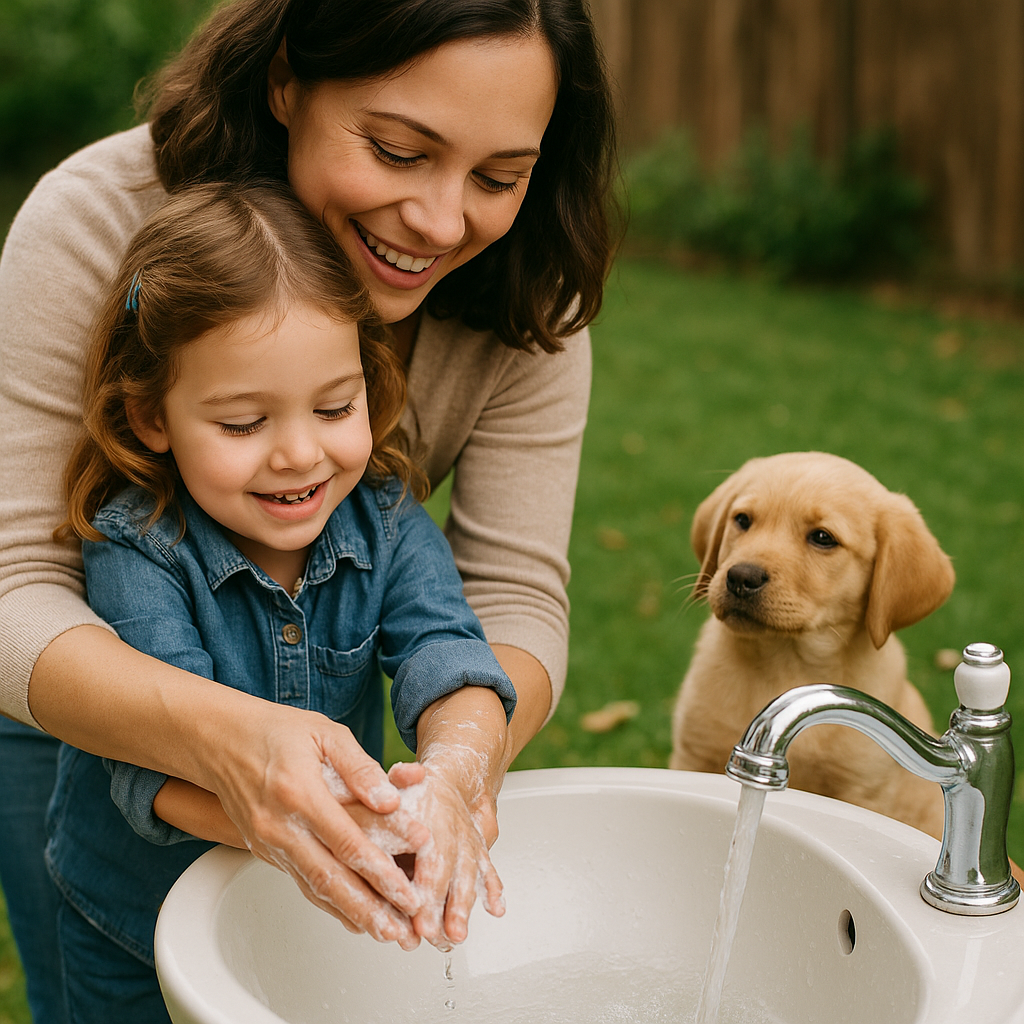
- Wash hands after touching your puppy, cleaning up poop, or being outside
- Teach children to wash hands after playing with the puppy
- Don’t allow kids to touch feces or let the puppy lick their faces
According to the CDC, roundworms and hookworms are zoonotic, meaning they can infect humans especially kids.
Flea, Rodent, and Food Hygiene
- Treat all pets with monthly flea control to prevent tapeworms
- Keep garbage secure and avoid rodent access
- Feed only commercial or fully cooked diets raw meat increases worm risks
- Prevent your puppy from eating feces or scavenging on walks
Routine Fecal Tests and Vet Exams
- Puppies should be tested multiple times in the first year
- Adult dogs: test once or twice a year, or more if visiting parks or daycares
- Some worms don’t show up in every sample, so repeat tests matter
In my clinic, I recommend 2–3 fecal tests before 6 months of age even for puppies on a strict deworming schedule.
How Your Vet Helps Keep Your Puppy Worm-Free
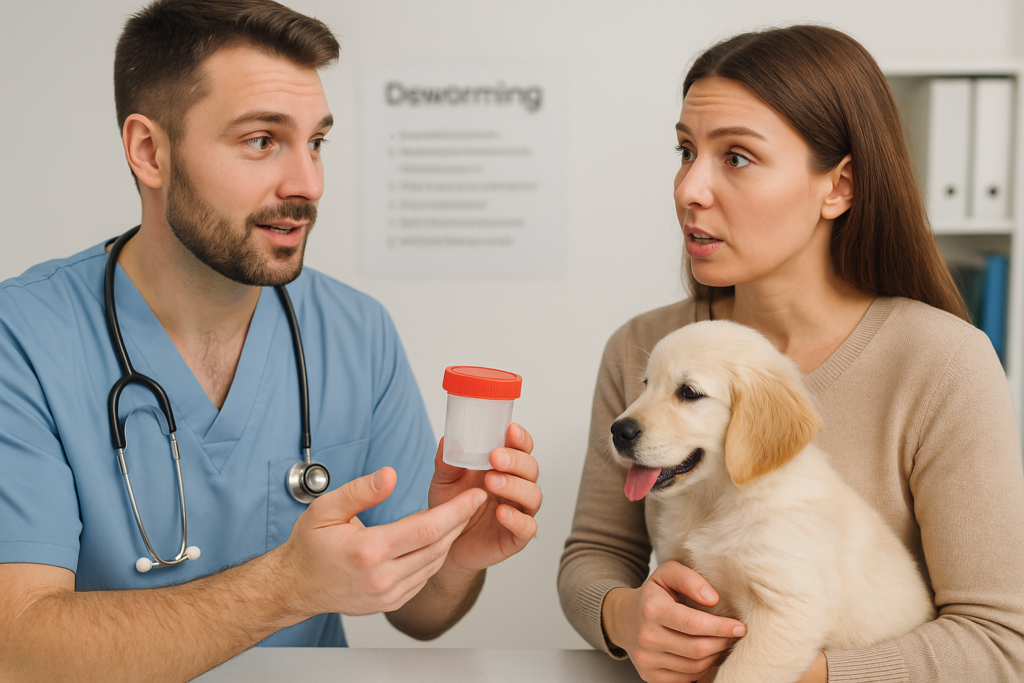
Veterinarians play a crucial role in diagnosing, treating, and preventing worm infections. Here’s how your vet supports your puppy’s long-term health:
Diagnosis and Testing
- Uses fecal flotation tests to detect eggs or larvae
- Identifies the type of worm (some need specific treatment)
- Examines any visible worms or segments you bring in
💡 Tip: Bring a fresh stool sample (less than 12 hours old) to every vet visit.
Tailored Deworming Plans
- Chooses the right product based on age, weight, and lifestyle
- Adjusts dose schedules if your puppy is from a shelter, travels, or lives with kids
- Recommends combination preventives when needed (e.g., Sentinel, NexGard Spectra)
I’ve had to tweak deworming plans for many rescue puppies with heavy burdens of multiple parasites it’s never one-size-fits-all.
Ongoing Prevention and Monitoring
- Suggests heartworm/intestinal worm preventives year-round
- Monitors for side effects after deworming
- Repeats fecal exams after treatment if the infection was severe or chronic
- May check bloodwork if hookworms caused anemia
FAQs About Puppy Deworming
How often should I deworm my puppy in Canada?
Start at 2 weeks of age and repeat every 2 weeks until 8 weeks old. Then, switch to monthly deworming until 6 months. After that, use either monthly preventives or deworm every 3 months depending on your vet’s advice.
Can I use human dewormers or home remedies?
No. Never use human medications on pets unless prescribed. Home remedies are often ineffective or harmful. Always use vet-approved products tailored for dogs.
Do indoor puppies still need deworming?
Yes. Puppies can be born with worms or pick them up from contaminated soil, fleas, or even shoes. Indoor pets are still at risk and should follow a vet-recommended schedule.
Is puppy deworming safe for young children around?
Yes if handled properly. Most deworming meds are safe, but supervise children and maintain hygiene (handwashing, no face-licking). Monthly deworming may be recommended if kids are in the home.
What if my puppy vomits after deworming?
Mild vomiting or soft stools can happen as worms are expelled. If symptoms persist more than a day, or your puppy seems weak or dehydrated, contact your vet right away.
Conclusion: Healthy Puppy, Healthy Family
With regular puppy deworming, good hygiene, and veterinary guidance, you can protect your pup from intestinal parasites and safeguard your whole household. Whether you’ve adopted a wriggly rescue or brought home a breeder-raised puppy, stick to a deworming schedule and ask your vet for help whenever you’re unsure. A parasite-free puppy grows stronger, plays harder, and stays healthier giving your family more joyful, worry-free moments together.

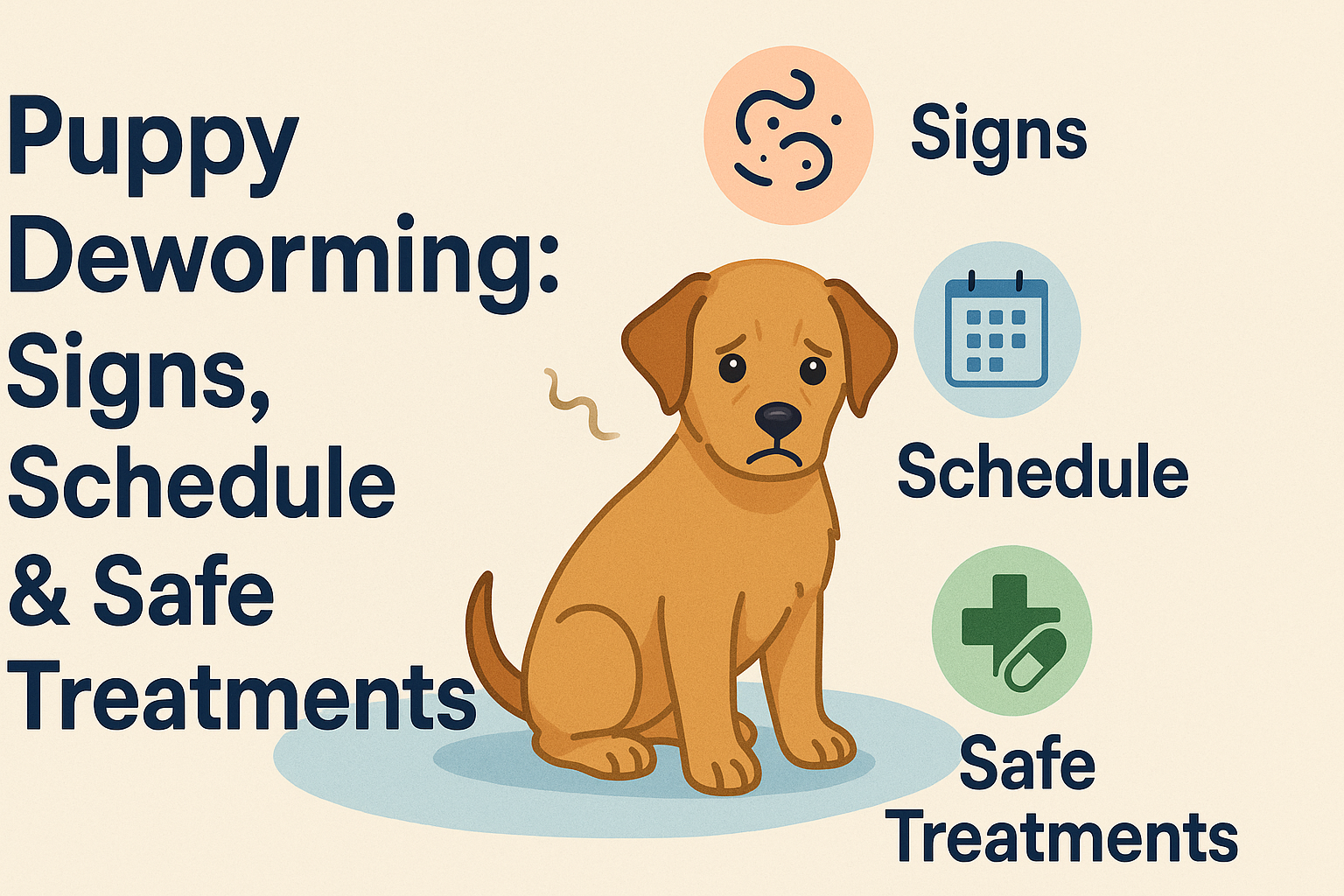



Pingback: Dog Vomiting: Essential Vet Tips for Safe Home Care and Emergencies
Pingback: Essential Puppy Vaccination Schedule 2025: Protect Your Pup with Confidence